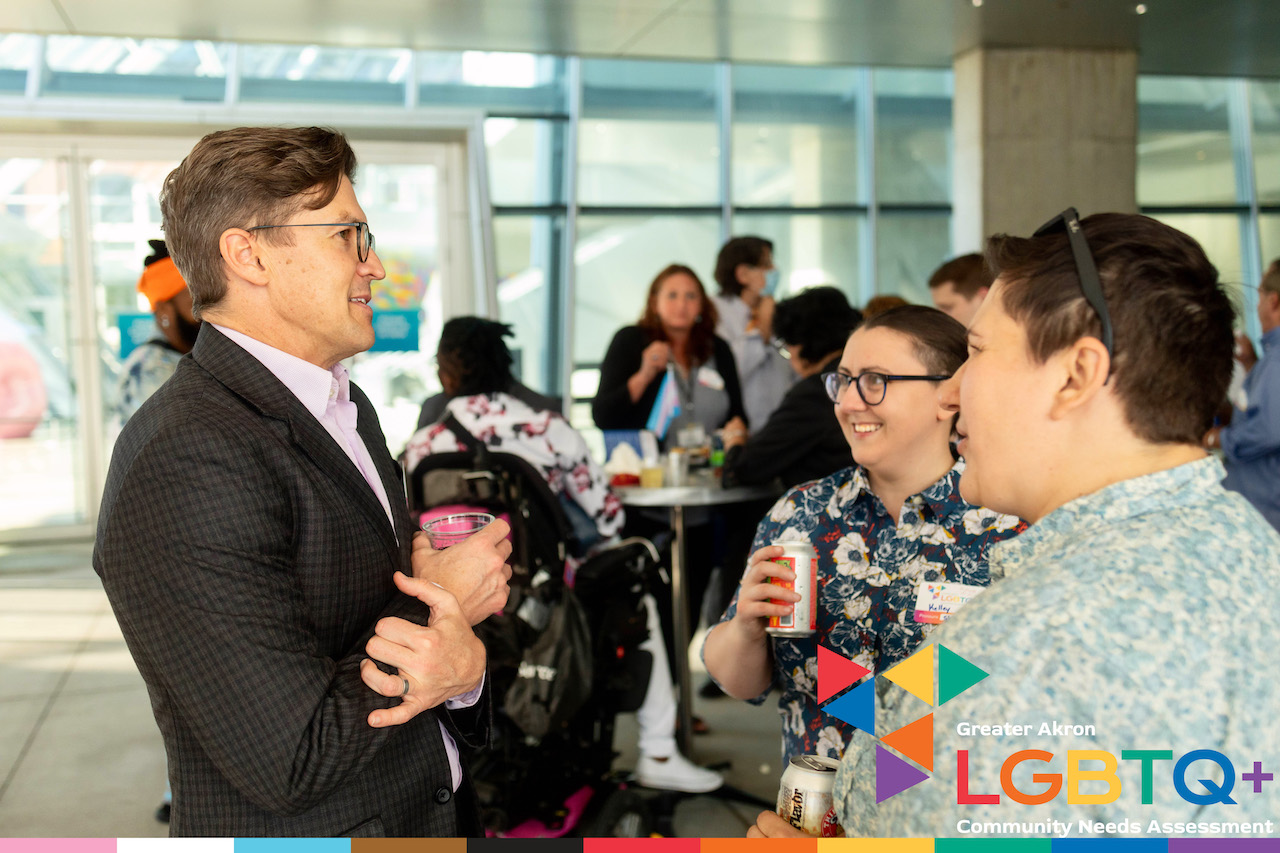A survey led by Â鶹ĘÓƵ's College of Public Health provided dozens of short- and long-term recommendations to improve the lives of LGBTQ+ people living in Greater Akron.
In all, the survey noted more than 50 areas for improvement across nine categories. It offered straightforward recommendations such as assisting more LGBTQ+ people in registering to vote, as well as more complex suggestions such as cultivating a culture of inclusiveness, open-mindedness, empathy, acceptance and respect both within and outside the LGBTQ+ community.

The needs assessment was spearheaded by Andrew M. Snyder, BSN, MPH, outreach program director for Â鶹ĘÓƵ's College of Public Health.
Community needs assessments are a tool public health professionals use to collect, synthesize and disseminate valuable information to support and validate decision making and commitments to implementing community health interventions, resources and investments.
A comprehensive LGBTQ+ specific community needs assessment had never been conducted in Greater Akron, making this initiative an essential first step toward improving the day-to-day lives of the local LGBTQ+ community.
The entire report can now be read at
During the second half of 2021, Snyder's team surveyed 1,002 people age 18 or older who identify as LGBTQ+ or allies, with questions geared toward the following goals:
-
Increase awareness about public health as it relates to the LGBTQ+ community in Greater Akron.
-
Lean into the local LGBTQ+ population demographically as the LGBTQ+ community is currently unassessed by the U.S. Census, leaving us to rely on estimates.
-
Describe the status of the local LGBTQ+ community holistically, not just focusing on weaknesses and unmet needs but also identifying strengths and achievements.
-
Develop a set of community recommendations based on participant input that inform future investments and decision making for the local LGBTQ+ community.
-
Strengthen partnerships and inter-organization collaborations within the local public health system.

Public Event Celebrates Results
The Results Are In! launch event brought together the region’s leadership to address health disparities in the LGBTQ+ community.
Nearly 200 guests, including the region's leadership, attended The Results Are In! event on Aug. 18, 2022, at the Akron Art Museum to hear more about the survey results.
Nine panelists from seven domains of holistic health shared their reactions and suggested the next steps to address areas of unmet needs and the community's strengths necessary to address these needs.

"It is exciting to see leaders from the many interdisciplinary sectors that make up the local public health system come together to learn more about the results of the assessment and the steps we can all take to make a better tomorrow for LGBTQ+ people,” Snyder said.
He said the survey results paint a rich picture of the current status of Greater Akron’s LGBTQ+ community, so there is much to embrace moving forward.
“Although the assessment is complete, we must move swiftly from assessment to action to ensure this compilation of community input is utilized to its full potential,” Snyder said.

Many questions focused on supporting the day-to-day needs of the LGBTQ+ community such as challenges with having enough to eat and, for some, knowing where their next meal will come from.
“Food insecurities are a common experience for many LGBTQ+ people. Ensuring LGBTQ+ people have access to affirming and welcoming spaces to obtain food assistance is essential," said Michael Wilson, director, Marketing and Communications, Akron-Canton Regional Food Bank.
Looking Beneath the Surface
The survey included two questions designed to elicit a deeper engagement toward real change.
“What is your biggest fear, concern, or worry for yourself as a member of the LGBTQ+ community right now?"
"What would help address or improve this fear, worry, or concern?”
The open-ended responses were analyzed independently by two members of the research team and categorized into recurring themes developed from the survey. The analysis is being submitted for peer review and will be uploaded later to the report.

The work in Greater Akron has led to interest from both Greater Cleveland and Greater Youngstown. Efforts are now underway to expand and adapt the LGBTQ+ Community Needs Assessment process in Greater Cleveland, focusing on Cuyahoga, Lorain, Lake and Geauga counties, following a $150,000 grant from the Cleveland Foundation. Leaders and stakeholders are also mobilizing a steering committee to expand the work to the Greater Youngstown area, focusing on Trumbull, Mahoning, Ashtabula and Columbiana counties.
"Expanding this work into Greater Cleveland and Greater Youngstown will give us the opportunity to collect grassroots health data across 12 Northeast Ohio counties impacting not only local LGBTQ+ communities but helping to build a regional LGBTQ+ public health infrastructure, which is currently lacking,” Snyder said.
"Congratulations to Andrew Snyder and the many members of the steering committee, volunteers and community members who came together to help this project find success. We are excited about the positive change this work is creating for the LGBTQ+ people living in northeastern Ohio,” said Sonia Alemagno, dean, Â鶹ĘÓƵ's College of Public Health.
For more information about this assessment, visit www.kent.edu/publichealth/lgbtq-greater-akron-community-needs-assessment.
For more information about Â鶹ĘÓƵ’s College of Public Health, visit www.kent.edu/publichealth.

